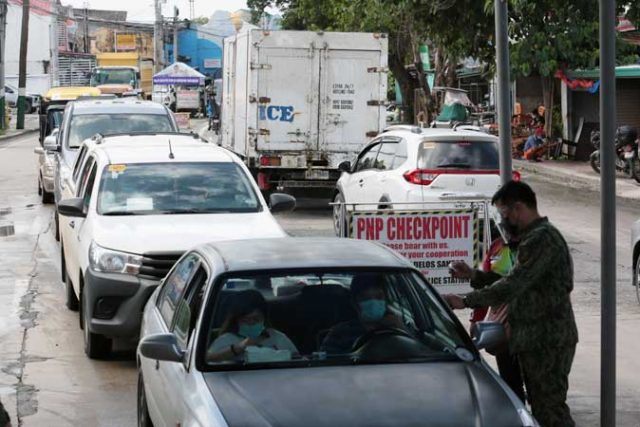Growth prospects could dim if NCR lockdown is extended

By Luz Wendy T. Noble and Kyle Aristophere T. Atienza, Reporters
THE PHILIPPINE economy’s recovery prospects could further deteriorate if the strict lockdown in the capital region goes beyond two weeks and extends to other regions, analysts said.
“The return of lockdowns is consistent with our view that the economic recovery will lag far behind ASEAN-5, as vaccination rates are among the lowest in the region, leaving the country susceptible to rolling COVID-19 (coronavirus disease 2019) waves and recurring lockdowns,” Nomura Global Research Chief ASEAN Economist Euben Paracuelles and analyst Rangga Cipta said in a note on Monday.
Nomura Global Research kept its gross domestic product (GDP) forecast for the Philippines at 5.4% this year, lower than the government’s 6-7% target.
However, Nomura’s analysts said “downside risks will rise if the enhanced community quarantine is prolonged beyond Aug. 6 to 20 and expanded to other areas,” noting Metro Manila accounts for 37.5% of GDP.
The government announced that the National Capital Region will be placed under an enhanced community quarantine, the most stringent level of lockdown, from Aug. 6 to 20 to curb a surge in coronavirus infections believed to be caused by the more contagious Delta variant.
Fitch Solutions Country Risk & Industry Research Senior Country Analyst Michael Langham warned that another lockdown could be “devastating” for the Philippines given its consumer-driven economy. For now, he said Fitch Solutions is keeping its 2021 growth forecast for the Philippines at 5.3%.
“The Philippine economy is so driven by domestic activity. When they do impose these lockdowns, it disrupts growth,” Mr. Langham said in an ANC interview on Monday.
Household spending, which accounts for 70% of the economy, shrank by 4.8% in the first quarter.
Mr. Langham said the impact of the lockdown would depend on its duration and the size of aid that will be distributed relative to economic loss.
He noted how the Philippine economy still suffered despite the passage of Republic Act 11469 or Bayanihan I, which realigned P275 billion from the 2020 budget for pandemic response.
Nomura’s Messrs. Paracuelles and Cipta do not expect significant aid despite the lockdown.
“Near-term fiscal support measures are also likely to be similarly small, with the government focusing on other priorities like infrastructure spending,” the analysts said.
BIGGER STIMULUS SOUGHT
Economic managers should consider a bigger stimulus measure to address potential lockdown-induced supply and demand shocks, economists said.
“It would be already pragmatic to institutionalize budget for stimulus/relief measures in case there would be hard lockdowns to respond to the current realities and always be ready for any contingencies,” said Rizal Banking Corp. Chief Economist Michael L. Ricafort.
“This would be part of increased readiness to have ready funds for social amelioration whenever there is a need to impose an enhanced community quarantine,” he said in a Viber message.
John Paolo R. Rivera, an economist at the Asian Institute of Management, said a bigger stimulus is needed to address a possible “consumption crunch” due to the lockdowns and tighter mobility restrictions.
“A bigger stimulus law, which will extend cash aid to the poorest, will allow households to augment consumption,” he said by telephone.
The Palace on Friday said it expects cash aid to be given to families affected by the lockdown of about P1,000 to P4,000 per family.
Sonny A. Africa, executive director of think tank Ibon Foundation, said a consumption-driven economy like the Philippines stands to benefit from a huge stimulus because it increases “aggregate demand and helps businesses to stay alive.”
“The national budget is the stimulus package,” Palace Spokesperson Herminio L. Roque, Jr. said at a televised news briefing when asked if the administration would push for a bigger stimulus as potential Delta-fueled lockdowns loom.
The government has a P4.506-trillion national budget for this year. Economic managers have approved a P5.024-trillion ceiling for next year’s national budget, which is set to be submitted to Congress before Aug. 25.
The proposed Bayanihan III, which allocates P400 billion for the pandemic response, including financial aid worth P2,000 for all Filipinos, has been approved by the House of Representatives but is pending at the Senate. However, economic managers have said they could only fund P173 billion for a stimulus response this year.
“Bayanihan III will draw the attention of legislators and highlight the important role of active government spending in the economic recovery,” Pamantasan ng Lungsod ng Maynila President Emmanuel A. Leyco in a Facebook Messenger chat.
He said economic managers must “re-examine their priorities and define their economic recovery strategies” before Congress tackles the 2022 national budget.
The pandemic should force the government to rethink its economic policy of managing the pace of economic growth by mainly adjusting the cost of private borrowing rather than increasing public spending, Ibon’s Mr. Africa said.
“Our economic managers still have this hangover from the 1980s era of fiscal austerity. They are still obsessed with fiscal austerity as something valid for its own sake,” he said by telephone.
“Frugality is counter-productive because it’s undermining our economic capacity. There’s nothing wrong with borrowing more money, especially now that they have been saying that we have a good credit rating,” Mr. Africa said. “Borrowing is not necessarily bad if it’s spent well.”
The Philippines has secured $18.4 billion in foreign loans as of June to fund its fight against the pandemic.
The National Government’s outstanding debt inched up to a new high of P11.166 trillion at the end of June. Economic managers expect the country’s debt stock to reach P11.98 trillion by the end of this year.
“We can still borrow more money for a stimulus, but under the assumption that it will be used properly,” Jefferson A. Arapoc, a behavioral economics professor at the University of the Philippines Los Baños, said. “Our external debt is still manageable.”



